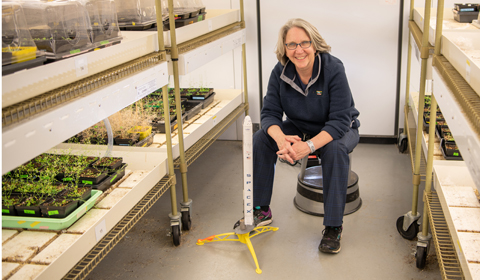
Dr. Sarah Wyatt in the growth lab with a model of the Falcon rocket that will take their experiment to the International Space Station. Photo by Ben Siegel
Dr. Sarah Wyatt was one of five Ohio University faculty receiving John C. Baker Fund awards for research, scholarship and creative work during spring semester 2021.
Wyatt is professor of Environmental & Plant Biology and director of the Molecular & Cellular Biology program.
Endowed in 1961 by a gift of more than $612,000 from 1926 College of Arts and Sciences graduate Edwin L. Kennedy and his wife, Ruth, a 1930 graduate of the College of Education, The John C. Baker Fund was established to support faculty improvement and research efforts. Up to $12,000 is available for each award.
Wyatt was awarded $11,999 for her work on “Plant Gravitropic Signaling: new approaches to old questions.”
“Plants have evolved intricate means of perceiving and responding to gravity. The root goes down to anchor the plant and gain nutrients and water; the shoot goes up to find light to be able to make sugars (food). While the effect of light and other stimuli can be studied by removing the stimulus, gravity is ever present on Earth. Most researchers trying to identify the physiological and molecular mechanisms involved in the gravity perception and response pathway use reorientation of the plant with respect to gravity—i.e. turning them on their side,” says Wyatt.
“But the ultimate control for gravity is spaceflight — a microgravity environment,” she says.
To identify genes that might regulate gravity response in plants, NASA provides spaceflight opportunities, but these are few and far between.
“Looking at data from any one spaceflight experiment results in hundreds of genes that are differentially expressed for each experiment. Finding signaling mechanisms is more challenging, these are transient events that don’t require large increases to be effective,” says Wyatt. Her team is performing meta-analysis of three gravity-related experiments to find the core genes that may direct gravity response. This analysis led to the selection of two transcription factors for further study.
To characterize the role these proteins may play in gravitropic signaling, her team proposes two aims:
- Aim 1: Identification of the DNA binding sites of the transcription factors identified: IQD21 and ERF104—Using chromatin immunoprecipitation (ChIP) followed by sequencing (ChIP-seq), they will determine the DNA binding motifs of IQD21 and ERF104.
- Aim 2: Determination of regulatory impact of IQD21 and ERF104—They will generate a list of genes that are potentially regulated by each transcription factor by identifying genes downstream of the transcription factor binding sites.
“By completing this project, we hope to determine each transcription factor’s role in regulating gravity response in plants, thereby enhancing our understanding of plant signaling and growth. These experiments are the final data needed for a manuscript on this project and will provide preliminary data for future grant proposals to NASA and/or the National Science Foundation.”



















Comments